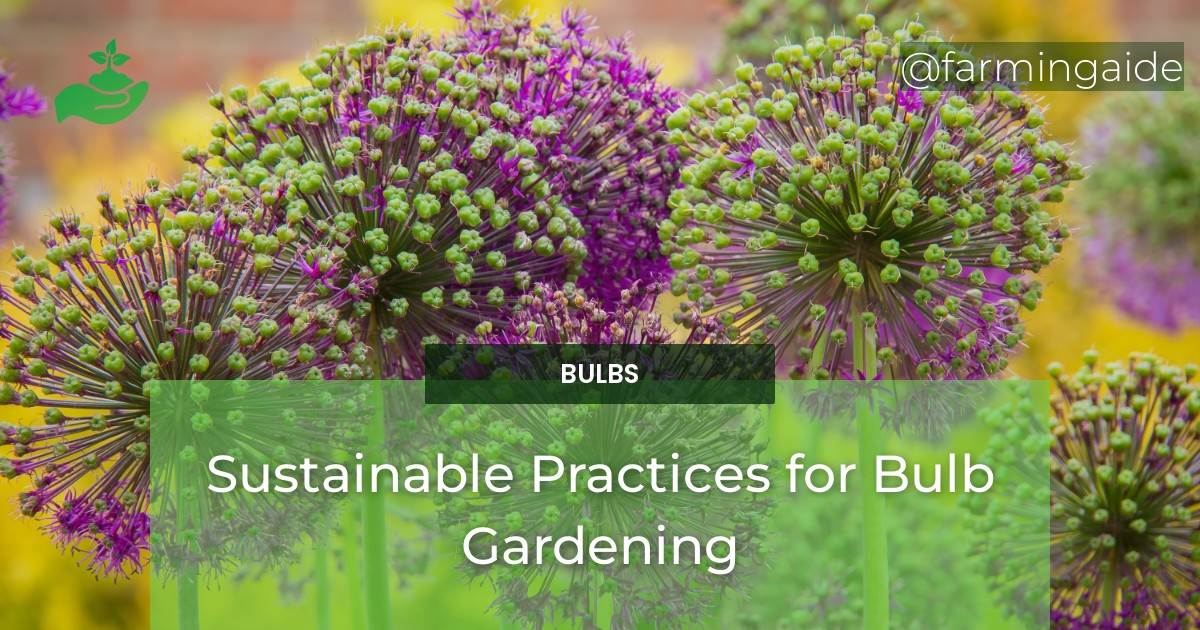One of the most rewarding ways to bring color and life to your garden is by growing bulbs. However, it’s important to consider the environmental impact of your gardening practices. By adopting sustainable practices, you can minimize your impact on the planet while still enjoying the beauty of blooming bulbs. In this article, we will explore eco-friendly tips and techniques for growing bulbs sustainably.
Choose Native Bulbs
Native bulbs are better for the environment because they are adapted to the local climate and require less maintenance. They also provide important habitat for pollinators and other wildlife. Here are some tips for identifying and choosing native bulbs:
- Consult with a local nursery or garden center for advice on native bulbs.
- Look for bulbs that are labeled as native or indigenous to your region.
- Research the natural habitats of local bulbs and try to replicate those conditions in your garden.
Use Organic Fertilizers
Synthetic fertilizers can harm the environment by contributing to pollution and damaging soil health. Organic fertilizers are a better choice for bulb gardening because they are made from natural, renewable materials. Here are some suggestions for organic fertilizers to use:
- Compost
- Bone meal
- Blood meal
- Fish emulsion
ALSO READ
Plant Bulbs at the Right Time
Timing is everything when it comes to bulb planting. Planting bulbs at the wrong time can lead to poor growth and blooming. Here are some tips for determining the right time to plant bulbs:
- Consult with a local nursery or garden center for advice on planting times.
- Research the ideal planting times for the specific bulbs you want to grow.
- Consider the climate and weather patterns in your area when determining planting times.
Plant in the Right Location
The location of your bulbs can have a big impact on their growth and blooming. Here are some tips for choosing the right location:
- Choose a location with well-draining soil.
- Choose a location with the appropriate amount of sunlight for the specific bulbs you want to grow.
- Avoid planting bulbs in areas with standing water or excessive moisture.
Companion Planting
Companion planting is the practice of planting different species of plants together to benefit one another. Here’s how companion planting can benefit bulb growth:
- Companion plants can help deter pests and attract beneficial insects to the garden.
- Companion plants can provide shade and protection to bulbs during hot weather.
- Companion plants can help improve soil health and fertility.
Crop Rotation
Crop rotation is the practice of rotating different crops in the same area over time. Here’s how crop rotation can benefit bulb growth:
- Crop rotation can help prevent the buildup of soil-borne diseases and pests.
- Crop rotation can help improve soil health and fertility.
- Crop rotation can help reduce soil erosion and runoff.
Water Conservation
Water conservation is an important consideration for any sustainable gardening practice. Here are some tips for conserving water while growing healthy bulbs:
- Use a drip irrigation system or soaker hose to deliver water directly to the roots of plants.
- Water early in the morning or late in the evening to minimize evaporation.
- Collect rainwater in a barrel or other container for use in the garden.
Use Sustainable Practices for Pest Control
Chemical pesticides can harm the environment and pollute water sources. Here are some natural and sustainable pest control methods:
- Handpick pests such as slugs and snails.
- Use companion planting to deter pests.
- Use insecticidal soap or neem oil as natural pest control methods.
Conclusion
Sustainable gardening practices are essential for minimizing our impact on the planet. By adopting eco-friendly practices for growing bulbs, you can create a beautiful garden while promoting a healthy environment. Remember to choose native bulbs, use organic fertilizers, plant bulbs at the right time and in the right location, use companion planting and crop rotation, conserve water, and use sustainable pest control methods. Happy bulb gardening!


